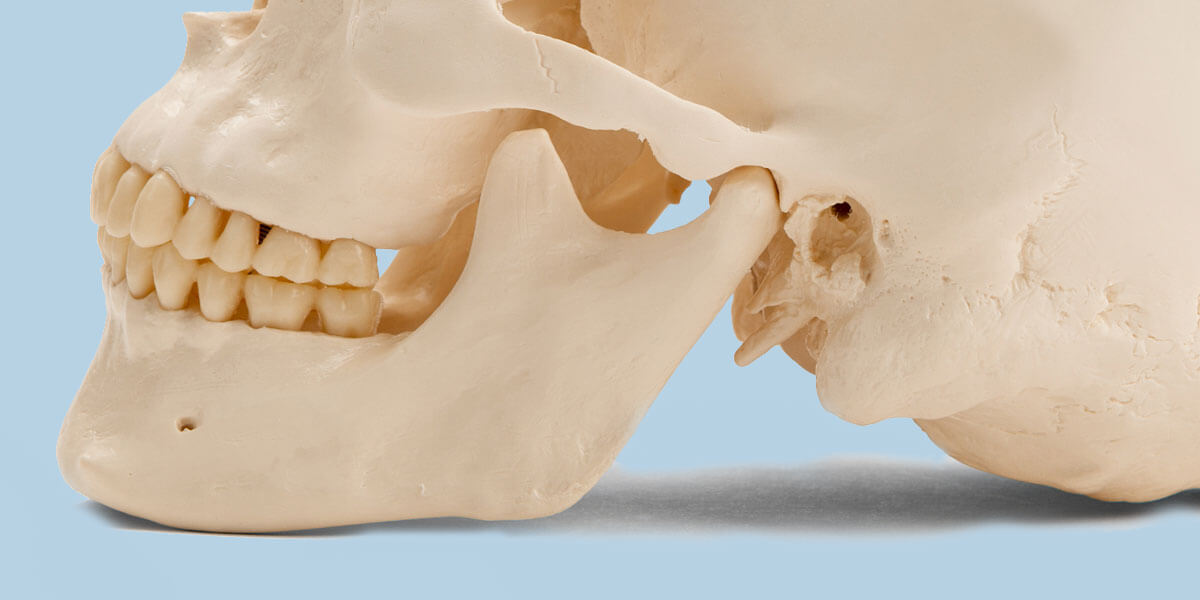TMJ Treatment in Holmdel, Brick & Oakhurst

Bella Dental provides treatment for TMJ in Monmouth and Ocean County, NJ. Contact us today to schedule an appointment.
What are TMJ Disorders?
The temporomandibular joint (TMJ) connects the jawbone to the skull. TMJ disorders often cause discomfort in the cheek, jaw, or ear areas and can affect normal jaw function.
TMJ conditions fall into three main categories:
- Myofascial pain – Discomfort or pain in the muscles that control jaw function. (Grinding teeth can result in this type of TMJ disorder.)
- Internal derangement of the joint – A possible indicator of a displaced disc, a dislocated jaw, or an injury to the condyle.
- Arthritis – A degenerative inflammatory disorder that can cause stiffness and pain
Mild cases of TMJ disorders may only cause annoying symptoms such as clicking, popping, or grinding sounds when the jaw is moved. Mild cases of TMJ can often be treated with self-managed care. Treatments include eating soft foods, using ice packs, and avoiding extreme jaw movement.
Moderate cases of TMJ may require treatments such as anti-inflammatory medications, Botox injections, stabilization splints, or custom night guards oral appliances.
Severe problems and pain resulting from a structural problem within the joint may require surgical treatments including replacement of the disc, or a complete jaw joint replacement.
Signs and Symptoms of TMJ Disorders
Signs and symptoms of irritation, inflammation, overuse, or structural problems within the temporomandibular joint include:
- Headaches
- Soreness in the cheek or jaw area
- Pain in or around the ears
- Facial pain
- Tight jaws
- Popping or clicking sounds when opening mouth
- Locking of the jaw
- Difficulty chewing
- Difficulty opening the mouth widely
- Ringing in the ear (tinnitus)
- Pain that radiates to the neck and shoulders
- Pain behind the eyes
Symptoms of TMJ may worsen due to stress, as studies show that stress increases the likelihood of teeth grinding and clenching. Fortunately, most people will find relief from TMJ using lifestyle modifications and non-invasive treatments. Surgery will be recommended only if all non-surgical treatments have failed to provide relief.
Why Choose Bella Dental?
With three convenient locations and five of New Jersey’s most respected and reputable dentists and specialists on staff, Bella Dental has a proven track record of success in treating TMJ disorders.
At Bella Dental, patient comfort and care are our priorities. To help patients who are fearful or anxious about receiving dental care, we offer various sedation options. Each of our offices is also equipped with the latest dental technologies that offer enhanced results and improved patient comfort.
Frequently Asked Questions About TMJ
Will TMJ go away on its own?
It may. Some people may only experience symptoms of TMJ once, or a few times in their lives. However, if you’re diagnosed with arthritis or dislocation in the joint, you may need ongoing treatment for TMJ.
When should I see a dentist for TMJ?
Notify your dentist as soon as possible if you develop symptoms of TMJ such as clicking, popping, grinding, or facial pain. Non-invasive treatment can often alleviate your symptoms, and prevent your symptoms from worsening.
What happens if I don’t treat TMJ?
That depends on the cause. If your TMJ pain is caused by teeth grinding, you’re also wearing away the enamel on your teeth making them more vulnerable to decay. Decay leads to cavities and gum disease. If your TMJ pain is caused by arthritis, and you don’t seek treatment, you may continue to experience pain from inflammation. If a structural problem exists within the joint, the pain will likely worsen, and you may experience difficulty chewing and speaking.
To schedule an appointment for TMJ treatment in Holmdel, Brick, or Oakhurst NJ, contact us today.
